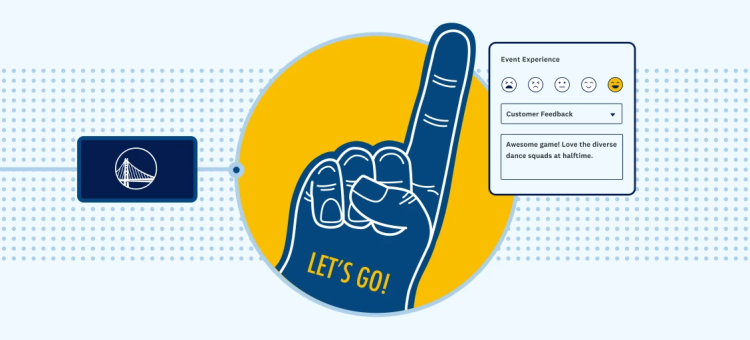To say that running Chase Center is a juggling act is an understatement. With 18,000 seats, the stadium hosts more than 200 events a year—everything from Golden State Warriors home games to rock concerts.
Despite the frenetic pace of business, Chase Center’s management company (also called the Golden State Warriors), doesn't let its commitment to diversity, equity, and inclusion (DEI) fall by the wayside. With the help of SurveyMonkey, the Warriors can easily prioritize DEI throughout their day-to-day operations, measure the success of DEI initiatives, and identify new opportunities to create more inclusive experiences.
Centering DEI within the employee experience
Prior to the start of the COVID-19 pandemic, Senior Vice President of People and Culture Erin Dangerfield and her team used annual engagement surveys to connect with their workforce of more than 2,500 employees. This resulted in feedback for a specific point in time, but they needed more employee feedback more frequently.
They began using SurveyMonkey to send monthly pulse surveys, which not only fueled their COVID-19 response, but enabled them to parse data by business unit, department, and demographics. Those latter metrics accelerated the Warriors’ DEI efforts by helping them get a deeper and more nuanced understanding of the employee experience within and outside of the pandemic’s unprecedented challenges.
“Using pulse surveys, we're able to measure exactly how different groups experience their work and their roles here,” explained Dangerfield. “We can find out if work/life balance differs amongst different groups of people. We can find out if groups are more engaged, or how people feel about our benefit plans, or whether they feel like their managers care about diversity, equity and inclusion.” With those results in hand, Dangerfield’s team made targeted decisions geared toward those individuals or groups, ensuring no voice went unheard.
Collecting consistent, real-time DEI data also gave the Warriors a solid foundation to grow their initiatives. “Employee feedback has essentially become like a KPI for us as we continuously try to improve DEI within the Warriors,” said Charles Gao, director of business strategy and analytics. “It's a measuring stick that allows us to say objectively, do people agree or not that we are accomplishing this.”
In addition to fueling long-term DEI goals, pulse surveys helped the Warriors assess whether employees felt the organization was contributing in meaningful ways to the broader community, particularly when it came to important social justice issues.
“One of the things that was really important to us was our response to the murder of George Floyd,” said Dangerfield. “We used pulse surveys to find out how our employees felt about our external diversity, equity and inclusion efforts, and to make sure we were aligning our internal messaging and employee engagement efforts with whatever we were doing externally.”
Those employee check-ins, Dangerfield believes, helped her HR team keep up with the evolving sentiment and needs of all employees.
“We live in a rapidly changing world and a rapidly changing industry. Having up-to-date information on what all our employees are experiencing is absolutely critical for us to engage with them and make good decisions.”
Erin Dangerfield, SVP of people and culture, Golden State Warriors
Shaping better customer experiences with DEI insights
With SurveyMonkey, the Warriors also discovered that there were opportunities to advance DEI in the customer experience—and that doing so would not only align with the company’s values but also the expectations of customers. For an organization invested in building experiences that resonate with fans, this was an especially important insight.
“Our customers can spend their money on a variety of different options to entertain themselves,” explained John Beaven, chief revenue officer. “So it's absolutely crucial for us to be tuned into what they want, what they expect, and be able to deliver on those high expectations.”
While using SurveyMonkey Audience to conduct market research on the in-game experience, the Warriors learned that fans wanted to see more diverse halftime performances. As a result, they introduced new dance teams that included junior, senior, and co-ed squads. Both casual fans and the passionate Dub Nation were enthusiastic about the change—a bold move that the organization wouldn’t have made as quickly or confidently without supporting data from SurveyMonkey.
“Understanding that our fans really care about diversity and inclusion being visible with our dance teams and how we present the game, that really helps us change the mold of the traditional dance teams that you might see across the industry,” said Gao. “It allowed us to customize the product to better fit the expectations of our consumers.”
For the Warriors, using SurveyMonkey to collect feedback from fans, employees, and the market has been a win-win for their business and DEI commitments.
“DEI is a reflection of where the world is heading and we definitely see it as an important strength of our organization,” said Gao. “The ability to listen to that, both on the customer front as well the employee front, continues to empower us to get better and better.”
Interested in how SurveyMonkey can help your business make better HR decisions and take action on DEI insights? Learn more about SurveyMonkey for HR professionals.




